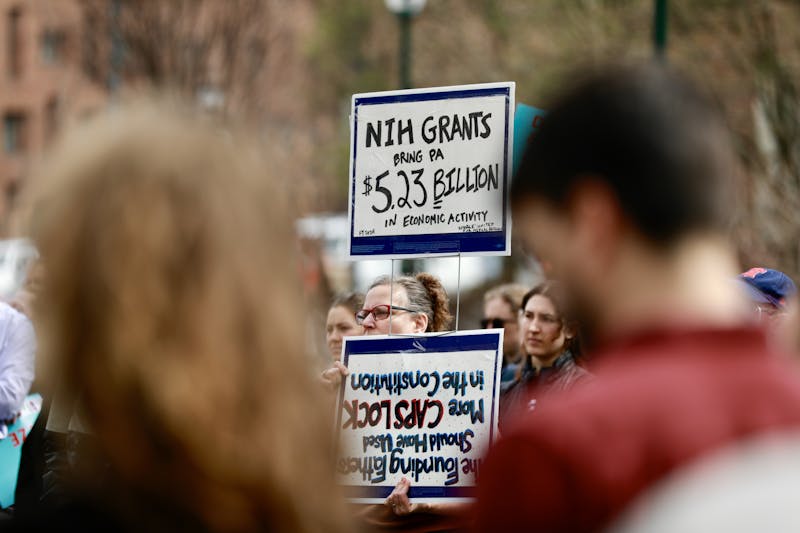
Over the weekend, a good friend of mine submitted her application for the Teach for America Program. She's excited about the prospect of getting accepted, and she wants to be involved in similar educational endeavors no matter what profession she eventually chooses.
There's only one catch -- she has no interest in actually teaching anywhere in America when she's done.
For those uninitiated underclassmen, Teach for America is a two-year program in which college graduates are sent to low-income school districts to help ease the burden caused by the nationwide teaching shortage. After an intense training session this summer, corps members will be placed in one of 21 areas across the country where they will teach a wide variety of grades and subjects depending on the needs of individual school districts. My friend is crossing her fingers to avoid South Dakota.
According to the Teach for America Web site, the ultimate goal is to find a "growing force of leaders" that, through work in different professions, can create "the systemic changes required to put children growing up in low-income communities on a level playing field with children from more affluent areas."
In many ways, it's a stopgap measure for schools in need of manpower. It is reasonable to assume, though, that one of the program's unspoken goals is to find a group of highly educated college graduates and turn them on to the often-inglorious profession of teaching.
It speaks volumes that college students, especially notoriously snooty Ivy Leaguers, would voluntarily give up two years of their time to work in a random school and teach underprivileged kids when they won't even give up five minutes of their time to vote. And the program has rightfully seen a tremendous spike in popularity over the last few years; application numbers have risen as the job market has plummeted.
But as Teach for America becomes more and more popular on a national scale, the question becomes whether the people who commit to the program do so because they really want to teach or because they want to put off the daunting process of applying to graduate school or selecting a career. Is Teach for America becoming the new chic way to put off graduate school? And if so, does that diminish the value of the program?
I know two people who have already taken part in Teach for America. One was born to be a teacher, and after graduating from Indiana University, he worked at a school in Phoenix, Ariz., for two years. He has now taken a full-time job as a teacher in another urban area and plans to stick it out in that admirable profession for the long haul.
Another friend is in the opposite boat. He doesn't really like kids, and he doesn't really like teaching, but he wasn't really sure what to do after graduating college. He's currently serving his time at an urban school, essentially counting down the days until his time is up. In fairness, he has certainly enjoyed some aspects of the experience, but he has no intention of continuing in the field of education when he's done.
I also know several other people who have applied to Teach for America simply because they just didn't know what else to do when they got their diplomas. They weren't all qualified to work in the program, and most didn't get accepted. But that can't be the type of trend that makes program organizers happy. This program was designed as a way to help low-income school districts, not as a way for college graduates to serve two years and leave the field of education behind.
Teach for America boasts that more than 60 percent of alumni remain in the education field after their two-year term expires. You have to wonder if that percentage will drop as the popularity of the program increases. With most applicant pools, more often equals diluted. It would be a sad commentary if Teach for America, a noble program with the best intentions, became too magnanimous for its own good.
This isn't to say that people won't grow to like teaching through the program or that they won't give it their best shot if accepted. And there's no question that teaching in a low-income school district is a harder job than many college graduates will ever have. The point is that Teach for America organizers could not have envisioned their program as a way for students to avoid going directly into graduate school, and it appears to be heading in that direction.
I hope my friend gets accepted to Teach for America because I know she'll do a great job in whichever school district she is placed. But I also hope that the selection committee turns away all of those people who don't seriously care about the public school system in this country. As the program becomes more popular, accepting those types of students has the potential to put Teach for America squarely on the wrong academic track.
Steve Brauntuch is a senior communications major from Tenafly, N.J., and former editorial page editor of The Daily Pennsylvanian. Statler and Waldorf appears on Wednesdays..
The Daily Pennsylvanian is an independent, student-run newspaper. Please consider making a donation to support the coverage that shapes the University. Your generosity ensures a future of strong journalism at Penn.
DonatePlease note All comments are eligible for publication in The Daily Pennsylvanian.







